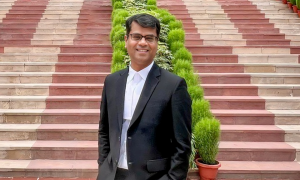This interview has been published by Namrata Singh and The SuperLawyer Team

Your career trajectory took a fascinating turn from working in operations management at an Air Hostess Academy to pursuing law. What inspired or motivated this shift in your professional focus, and was there a specific event or realization that sparked your interest in this field?
My shift in professional focus from operations management to law was motivated by a desire for intellectual challenge and a deeper engagement with the legal system. The decision to pursue law was not precipitated by a single event, but rather a gradual realization of my passion for justice, advocacy, and the complexities of the legal framework. However, my fascination with legal principles and their diverse applications burgeoned during my involvement with Lawrato, where I partnered with Mr. Rohan Mahajan in managing backend legal operations. It was during this time that the decision to pursue a career in law crystallized for me. I delved deeper into understanding the legal landscape, I found myself drawn to its intricacies and the potential to make a meaningful impact through legal practice.
Ultimately, the transition to law represented a natural evolution of my career aspirations, aligning with my values of fairness, integrity, and a commitment to serving others. I am excited about the opportunities that the field of law presents for personal and professional growth, and I am eager to contribute my skills and experiences to this dynamic and rewarding profession.
Your initiative, WizCyber, aims to promote cyber safety and awareness globally. What inspired you to establish this platform, and what impact do you hope to achieve?
The inspiration behind establishing WizCyber stemmed from witnessing the increasing prevalence of cyber threats and the profound impact they have on individuals, businesses, and society as a whole. Collaboration with Col. Sanjeev Relia (Retd.) in this initiative we recognized the critical need for proactive measures to address these challenges, I felt compelled to take action and contribute to the collective effort in safeguarding digital environments.
As technology continues to advance rapidly, so do the tactics employed by cyber criminals, making it essential for individuals and organizations to stay informed and equipped with the necessary knowledge and tools to protect themselves. WizCyber was founded with the vision of empowering people with practical cybersecurity guidance, resources, and educational content to navigate the digital landscape safely and confidently.
After been appointed as Empaneled Faculty with Institute of Secretariat Training and Management, Government of India, driven by a passion for mentoring and guiding students and aspiring professionals, conducting campaigns in Various schools and corporates globally. Our primary goal is to make a tangible impact by raising awareness about cybersecurity best practices, providing actionable insights to mitigate risks, and fostering a culture of cyber resilience across diverse communities worldwide. Through collaborative partnerships, educational initiatives and advocacy efforts, we aspire to create a safer online ecosystem where individuals and organizations can thrive securely.
We believe that by fostering a proactive approach to cybersecurity and empowering individuals with the right knowledge and skills, we can significantly reduce the incidence of cyber threats and their associated impacts. Our ultimate aim is to contribute to a safer and more secure digital future for all.
With your experience in handling various cases on cybercrime, could you shed light on some common misconceptions people have about cyber threats?
One prevalent misconception is that only large corporations or high-profile individuals are targeted by cybercriminals. In reality, cyber threats do not discriminate based on size or status; individuals, small businesses, and organizations of all types are vulnerable to attacks. Cybercriminals often exploit vulnerabilities in software, weak passwords, or unsuspecting users to gain unauthorized access to personal or sensitive information.
Another misconception is that antivirus software provides complete protection against all cyber threats. While antivirus software is an essential component of cybersecurity, it is not a foolproof solution. Cyber threats continue to evolve, with sophisticated malware and social engineering tactics bypassing traditional antivirus measures. Therefore, it’s crucial for individuals and organizations to implement a multi-layered approach to cybersecurity, including regular software updates, strong password management, and user awareness training.
Additionally, there is a misconception that cybersecurity is solely a technical issue and not a human one. While technology plays a significant role in mitigating cyber threats, human behaviour also contributes to cybersecurity vulnerabilities. Factors such as phishing scams, social engineering tactics, and careless handling of sensitive information can pose significant risks. Therefore, raising awareness and educating users about cybersecurity best practices is essential in minimizing these human-related risks.
Lastly, some people believe that cyber threats are isolated incidents and not a continuous, ongoing threat. However, cyber threats are persistent and constantly evolving, with cybercriminals adapting their tactics to exploit new vulnerabilities and technologies. Therefore, cybersecurity should be approached as an ongoing process rather than a one-time solution, with regular assessments, updates, and training to stay ahead of emerging threats.
By addressing these common misconceptions and promoting a better understanding of cyber threats, we can empower individuals and organizations to take proactive steps towards enhancing their cybersecurity posture and reducing their risk exposure.
As a mentor to students and professionals, what advice would you give to the current generation aspiring to pursue a career in cyber law or cybersecurity?
For those considering a career in cyber law or cybersecurity, I would offer the following advice:
Educate Yourself: Begin by building a solid foundation of knowledge in both law and cybersecurity. Pursue relevant educational opportunities, such as degree programs, certifications, and workshops, to develop expertise in these areas.
Stay Updated: The field of cybersecurity is constantly evolving, with new threats and technologies emerging regularly. Stay informed about the latest developments, trends, and best practices through continuous learning and professional development.
Gain Practical Experience: Seek out opportunities to gain hands-on experience in cybersecurity through internships, volunteer work, or entry-level positions. Practical experience will not only enhance your skills but also provide valuable insights into real-world challenges and solutions.
Network: Connect with professionals in the field of cyber law and cybersecurity through networking events, industry conferences, and online communities. Building relationships with experienced professionals can provide mentorship, guidance, and potential career opportunities.
Develop Soft Skills: In addition to technical skills, cultivate soft skills such as communication, problem-solving, and critical thinking. Effective communication and collaboration are essential for success in both cyber law and cybersecurity roles, particularly when interacting with diverse stakeholders.
Ethical Considerations: Aspiring professionals in cyber law and cybersecurity must also consider ethical implications and responsibilities. Uphold ethical standards, respect privacy rights, and prioritize the ethical use of technology in your work.
By following these pieces of advice and remaining dedicated to continuous learning and growth, aspiring individuals can position themselves for success in the dynamic and rewarding field of cyber law and cybersecurity.
Given your extensive experience, could you share some key trends or emerging challenges in cyber law that professionals should be aware of?
As the digital landscape continues to evolve, several trends and challenges are shaping the practice of cyber law and requiring the attention of legal professionals:
Cybersecurity Incident Response: As cyber threats become more sophisticated and prevalent, organizations are increasingly experiencing cybersecurity incidents such as data breaches and ransomware attacks. Cyber law professionals must be well-versed in incident response protocols, breach notification requirements, and legal obligations to mitigate the impact of cyber incidents on their clients.
Cybercrime Prosecution: The rise of cybercrime poses significant challenges for law enforcement and legal professionals. From cyber fraud and identity theft to cyber espionage and online harassment, prosecuting cybercriminals requires specialized knowledge of digital forensics, jurisdictional issues, and international cooperation frameworks.
Artificial Intelligence and Automation: The integration of artificial intelligence (AI) and automation technologies presents both opportunities and challenges in the realm of cyber law. Legal professionals must grapple with complex legal and ethical considerations surrounding AI algorithms, autonomous systems, and liability for AI-driven decisions.
Regulation of Emerging Technologies: Emerging technologies such as blockchain, Internet of Things (IoT), and cryptocurrency present novel legal issues and regulatory challenges. Cyber law professionals need to anticipate regulatory developments, advise clients on compliance strategies, and navigate legal uncertainties associated with these technologies.
By staying informed about these key trends and emerging challenges, legal professionals can effectively navigate the complex and rapidly evolving landscape of cyber law and provide valuable guidance to their clients.
Apart from your work in cyber law, you’ve also assisted various startups. How do you think entrepreneurship intersects with cybersecurity, especially for new ventures?
Entrepreneurship and cybersecurity are closely intertwined, especially for new ventures that are navigating the complexities of the digital landscape. As startups innovate and develop new products or services, they must also prioritize cybersecurity to protect their assets, data, and reputation. Here are some key points to consider:
Risk Management: Cybersecurity is a critical aspect of risk management for startups. New ventures often have limited resources and may be particularly vulnerable to cyber threats due to their innovative technologies or lack of robust security measures. Therefore, entrepreneurs must proactively identify and mitigate cybersecurity risks to safeguard their business operations and intellectual property.
Investor Confidence: Investors and stakeholders increasingly consider cybersecurity readiness as a factor when evaluating startup opportunities. Demonstrating a proactive approach to cybersecurity can enhance investor confidence and differentiate a startup in a competitive market landscape.
Customer Trust: Building and maintaining customer trust is paramount for startups. Strong cybersecurity practices reassure customers that their data is protected, fostering long-term relationships and loyalty. Conversely, a data breach or security incident can severely damage a startup’s reputation and credibility.
Cybersecurity Culture: Cultivating a culture of cybersecurity awareness and responsibility is vital for startups. Employees should be educated about cybersecurity best practices, trained to recognize and respond to potential threats, and encouraged to report security incidents promptly.
Partnerships and Collaboration: Startups can benefit from partnerships and collaborations with cybersecurity experts, industry associations, and government agencies. Engaging with the broader cybersecurity community can provide access to resources, expertise, and support to strengthen cybersecurity posture.
Overall, entrepreneurship and cybersecurity are complementary aspects of building a successful startup in today’s digital economy. By integrating cybersecurity into their business strategies and operations, entrepreneurs can mitigate risks, enhance trust, and position their ventures for sustainable growth and success.
Despite your extensive experience and accomplishments in the field, what inspired you to pursue a Ph.D. in Cyber Protection Management at this stage of your career?
The decision to pursue a Ph.D. in Cyber Protection Management stems from a combination of factors, including a deep-seated passion for advancing knowledge in cybersecurity, a commitment to lifelong learning, and a desire to make a significant contribution to the field.
Despite my years of experience and achievements, I recognize that cybersecurity is a rapidly evolving and multifaceted domain, continually presenting new challenges and opportunities for innovation. A Ph.D. program offers a structured environment to delve deeper into specialized areas of cybersecurity, conduct original research, and develop expertise that can contribute to addressing pressing cybersecurity issues.
Moreover, pursuing a Ph.D. aligns with my long-term career goals of becoming a thought leader and subject matter expert in cybersecurity. By engaging in rigorous academic inquiry and scholarly discourse, I aim to broaden my understanding of complex cybersecurity concepts, refine my analytical skills, and develop innovative solutions to real-world cybersecurity challenges.
Additionally, earning a Ph.D. opens doors to opportunities for teaching, mentoring, and disseminating knowledge to future generations of cybersecurity professionals. I am passionate about sharing my insights and experiences with aspiring cybersecurity practitioners and contributing to the education and training of the next wave of cybersecurity leaders.
Ultimately, pursuing a Ph.D. in Cyber Protection Management represents a natural progression in my career journey, allowing me to deepen my expertise, expand my professional network, and make a meaningful impact on the field of cybersecurity.
With such a dynamic and demanding career, how do you unwind and recharge outside of your professional endeavors? Could you share some of your favorite hobbies or relaxation techniques that help you maintain balance amidst your busy schedule?
Balancing work and personal life is essential for maintaining overall well-being and productivity. Here are some of my favorite hobbies and relaxation techniques that help me achieve balance amidst my busy schedule. Spending time outdoors with my kids and pet allows me to disconnect from technology and reconnect with nature. Whether it’s hiking in the mountains, cycling along scenic trails, or simply taking a leisurely walk in the park, being outdoors helps me clear my mind and rejuvenate my spirit.
Reading: Reading is one of my favorite pastimes and a great way to unwind after a long day. Whether it’s fiction, non-fiction, or professional literature related to my field, immersing myself in a good book helps me relax, gain new perspectives, and expand my knowledge.
Exercise and Fitness: Physical activity is essential for maintaining both physical and mental well-being. Whether it’s hitting the gym, practicing yoga, or going for a run, regular exercise helps me relieve stress, boost my mood, and increase my energy levels.
Quality Time with Loved Ones: Being a mother of twins I love spending time with my children and my pet, it is invaluable for maintaining work-life balance. Whether it’s sharing a meal, watching a movie, or simply having meaningful conversations, connecting with loved ones helps me recharge and cultivate a sense of belonging and support.
Mindfulness and Meditation: Practicing mindfulness and meditation techniques helps me cultivate inner peace, reduce stress, and improve focus and clarity of mind. Taking a few moments each day to practice mindfulness allows me to center myself and approach challenges with a calm and balanced perspective.
By incorporating these hobbies and relaxation techniques into my routine, I am able to maintain a sense of balance and well-being amidst the demands of my professional career.
As a cyber law expert deeply involved in cyber safety initiatives, could you share some practical tips for our readers on how they can protect themselves from cyber threats or cybercrime in their daily lives?
Here are some practical tips for protecting oneself from cyber threats or cybercrime in daily life:
Use Strong, Unique Passwords: Create complex passwords for your accounts, using a combination of letters, numbers, and special characters. Avoid using easily guessable information such as birthdays or pet names. Consider using a password manager to securely store and manage your passwords.
Enable Two-Factor Authentication (2FA): Whenever possible, enable two-factor authentication for your online accounts. This adds an extra layer of security by requiring a secondary form of verification, such as a code sent to your mobile device, in addition to your password.
Keep Software Updated: Regularly update your operating system, web browsers, antivirus software, and other applications to patch security vulnerabilities and protect against known threats. Enable automatic updates whenever possible to ensure timely protection.
Be Wary of Suspicious Emails and Links: Exercise caution when opening emails or clicking on links from unknown or suspicious sources. Be vigilant for phishing attempts, where attackers impersonate legitimate entities to trick you into revealing personal information or downloading malware.
Secure Your Devices: Use encryption and security features such as device passcodes, biometric authentication (e.g., fingerprint or face recognition), and remote wipe capabilities to protect your smartphones, tablets, and computers from unauthorized access.
Practice Safe Browsing Habits: Be cautious when accessing websites, especially those that require you to enter personal or financial information. Look for HTTPS encryption and reputable security seals. Avoid downloading software from untrusted sources, as they may contain malware.
Protect Your Personal Information: Limit the amount of personal information you share online, especially on social media platforms. Be mindful of the privacy settings on your accounts and consider what information you make publicly available.
Monitor Financial Accounts Regularly: Regularly review your bank and credit card statements for any unauthorized transactions or suspicious activity. Report any discrepancies to your financial institution immediately.
Backup Your Data: Regularly backup important files and data to a secure external hard drive, cloud storage service, or backup solution. This ensures that you can recover your information in the event of data loss or ransomware attacks.
Stay Informed and Educated: Keep yourself updated on the latest cyber threats, scams, and best practices for cybersecurity. Attend cybersecurity awareness training, read reputable cybersecurity blogs or news sources, and share knowledge with friends and family.
By following these practical tips and adopting a proactive approach to cybersecurity, you can better protect yourself from cyber threats and minimize the risk of falling victim to cybercrime in your daily life.


























